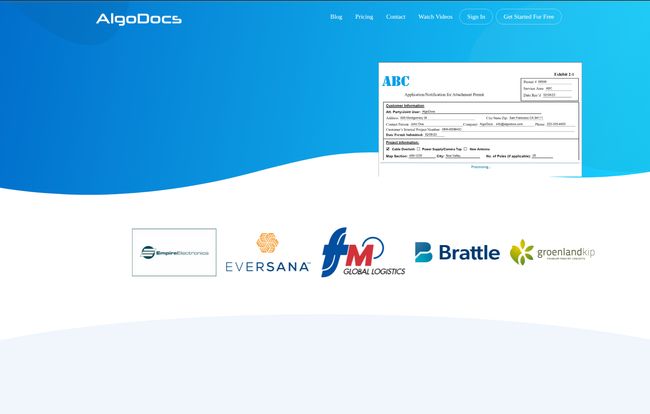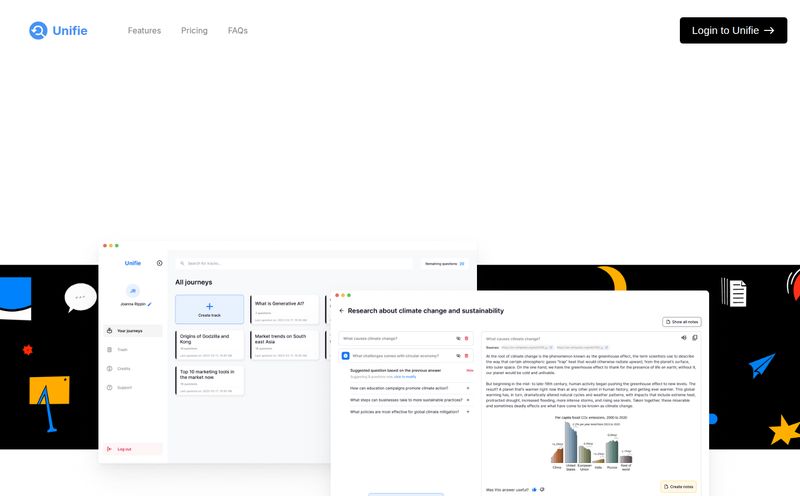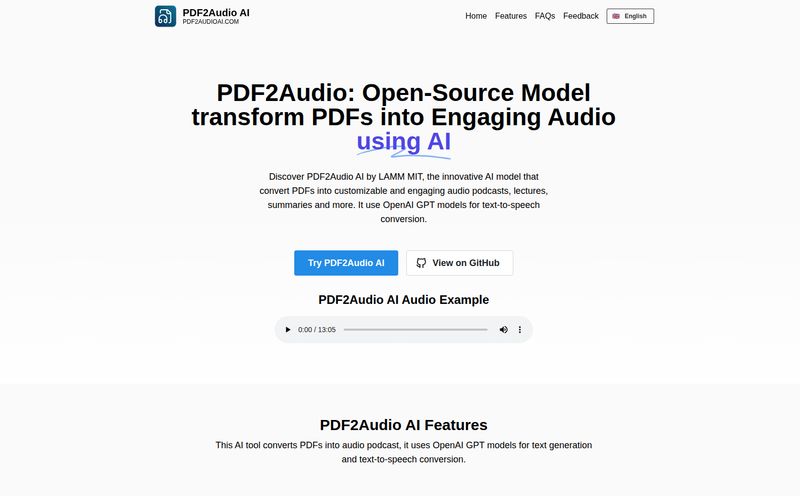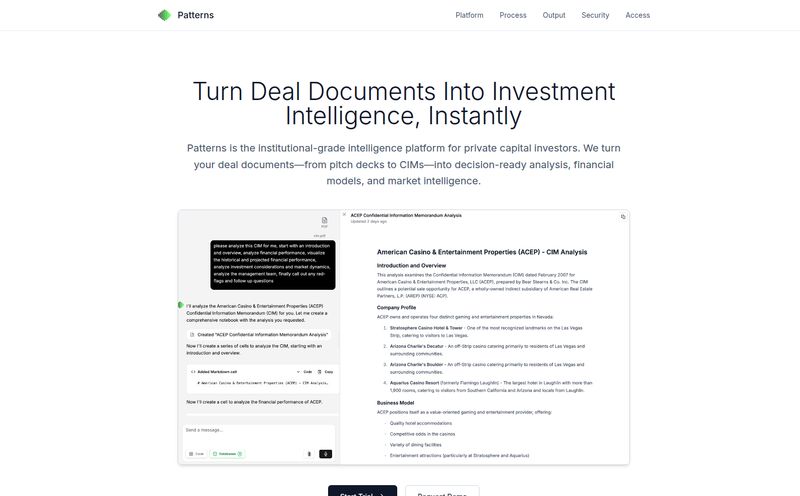If you've ever worked in an office, you've faced The Pile. You know the one. It might be a physical stack of invoices threatening to topple over, or a digital folder overflowing with PDFs that all need... something. Some piece of data, a number, a name, a table, needs to be plucked from each one and put into a spreadsheet or a system. It’s the digital equivalent of digging a ditch with a spoon. Mind-numbing, error-prone, and a colossal waste of time.
I've been in the SEO and digital marketing world for years, and I've seen this time and time again. Companies with brilliant strategies, held back by the sheer grunt work of data management. We spend so much time generating traffic and leads, only to get bogged down in the paperwork that follows. So when a tool like AlgoDocs comes across my desk, claiming to use AI to automate all of that, my ears perk up. But I’m also skeptical. We’ve all seen tools that promise the world and deliver a pamphlet. So, is AlgoDocs the real deal? I decided to take a closer look.
What on Earth is AlgoDocs, Anyway?
So what's the big idea? At its core, AlgoDocs is an AI-powered data extraction platform. That’s a fancy way of saying it’s a smart robot that reads your documents for you. You feed it PDFs, scanned invoices, purchase orders, you name it—and it intelligently pulls out the specific information you need. Think of it less like a simple scanner (which just makes a picture of a document) and more like a junior data analyst who never needs a coffee break and has spectacular eyesight.
It uses a combination of Optical Character Recognition (OCR), AI, and Image Processing to not just see the text, but to understand it. It knows the difference between an invoice number and a total amount. That’s the magic trick here. It’s not just about turning an image into text; it’s about turning unstructured documents into structured, usable data.
The Problem It Solves Is a Real Pain
I once had a client, a thriving little e-commerce shop, that was drowning in success. Their problem? Every single order generated a PDF invoice from their supplier. The owner was spending nearly two hours a day—every single day—manually keying supplier SKUs, quantities, and costs into QuickBooks. It was a bottleneck that was actively costing them money and sanity. The risk of a typo throwing off their entire inventory was huge. This is precisely the kind of nightmare AlgoDocs is built to solve.
Manual data entry is not just boring; it's expensive. It’s full of human error (we all make them!), it’s slow, and it keeps smart people from doing, well, smarter work. Automating this doesn't just save time, it frees up brainpower for growth, strategy, and customer service.
A Look at The Key Features
Okay, so it sounds great in theory. But what does it actually do? I took a stroll through its capabilities, and a few things definately stood out.
AI-Powered Extraction: The Brains of the Operation
This is the main event. You can set up what they call “extractors” to look for specific fields. For an invoice, you might tell it to always find the “Invoice Number,” “Due Date,” and “Total Amount.” You can even train it to pull entire tables of line items. The AI part means it gets smarter over time and can handle variations in document layouts. Pretty neat.
From PDF to Excel in a Snap
Once AlgoDocs has grabbed your data, it doesn't just hold it hostage. You can instantly export everything to formats you actually use, like Excel or JSON. This is critical. Getting data out of a system is just as important as getting it in. This feature alone bridges the gap between messy documents and clean, analyzable spreadsheets.

Visit AlgoDocs
Playing Nice with Others: Software Integrations
For me, a tool's ability to integrate is a make-or-break issue. AlgoDocs seems to get this. They specifically mention integrations with accounting software like QuickBooks and Xero. This turns the tool from a simple data scraper into a core part of your financial workflow. No more exporting to Excel just to turn around and import it somewhere else. It can become a direct pipeline.
Let's Talk Money: The AlgoDocs Pricing Structure
Alright, the part everyone scrolls down for. The price. I have to say, their pricing model is refreshingly clear and, frankly, very accommodating. Here’s a quick breakdown of their monthly plans:
- Free Plan: You get up to 50 pages per month for $0. Yes, free. This is huge. It lets you genuinely test the platform on your own documents without dropping a credit card.
- Basic: For $23/month, you get up to 300 pages. A great step up for small businesses or freelancers.
- Business: At $84/month, this jumps to 1,500 pages. This seems like the sweet spot for a company with moderate document flow.
- Ultimate and Beyond: The plans scale all the way up to 150,000+ pages per month, with enterprise and on-premise solutions available if you're a massive operation.
They also offer a 17% discount if you pay annually, which is a pretty standard but welcome perk. In my opinion, the existence of a truly functional free tier makes AlgoDocs instantly worth a try. There's literally no financial risk to see if it can solve your specific data entry problem.
The Good, The Bad, and The Nitty-Gritty
No tool is perfect, right? So let's get into the weeds. Based on their own documentation and some user feedback, here’s my take.
The good stuff is obvious. It’s fast, the accuracy is reportedly very high—one Senior Data Analyst, Anna Bello, was quoted saying it's “100%” and that the team is “incredible.” That's high praise. The core benefit of reducing soul-crushing manual work and the errors that come with it cannot be overstated. It supports a wide variety of document types and has those crucial integrations.
Now, for the potential hiccup. The one “con” I've seen mentioned is that the extractors can be “tricky to set up.” I read this not as a flaw, but as a dose of reality. This is a powerful, customizable tool. It's not an 'idiot-proof' app with one button. For very complex or non-standard documents, you're probably going to have a bit of a learning curve to get it just right. To me, that’s fair. The trade-off for power is often a little bit of complexity. They also note that custom formats might require a poke to their support team, which is good to know upfront.
So, Who is AlgoDocs Actually For?
In my professional view, AlgoDocs is a fantastic fit for a few key groups:
- Small to Medium-Sized Businesses: Especially those in e-commerce, logistics, or services who handle a steady stream of invoices, purchase orders, or receipts.
- Accounting and Bookkeeping Departments: This is a no-brainer. The potential to automate data entry into software like QuickBooks is immense.
- Data Analysts: Anyone who has ever been handed a folder of 1,000 PDFs and been told to “find the trends” will see the beauty in this.
Who isn't it for? If you only process a handful of documents a month, the free plan is perfect, but you might not need the power of the paid tiers. But then again, if it saves you an hour for free, why not?
Frequently Asked Questions About AlgoDocs
I dug around and found some common questions people have. Here are the quick-and-dirty answers.
How does the credit system and pricing work?
It's page-based. One credit equals one page processed. Your plan gives you a certain number of credits per month, and they reset on your billing cycle. Unused credits don't roll over, so it's best to pick a plan that matches your actual usage.
What kind of documents and languages does it support?
It handles a ton of document types—invoices, receipts, bank statements, purchase orders, and more. It also supports various languages, which is a big plus for international businesses.
Is there a limit on how many pages a single document can have?
According to their FAQ, there's no technical limit on the number of pages in a single document you upload. Just be aware that a 200-page document will use 200 of your monthly credits.
Is AlgoDocs secure and GDPR compliant?
Yes. They state they are GDPR compliant. Security is obviously huge when you're dealing with sensitive financial documents, and they seem to take it seriously.
My Final Verdict on AlgoDocs
So, what's the final word? I'm genuinely impressed. In a sea of AI tools that feel more like gimmicks, AlgoDocs is focused on solving a very real, very annoying business problem. It’s not trying to be everything to everyone. It’s built to do one thing—extract data from documents accurately and efficiently—and it looks like it does it very well.
The combination of a powerful feature set, scalable pricing, and that all-important free plan makes it a compelling option. While there might be a small learning curve for custom documents, the potential ROI in saved time and reduced errors is massive. If you're feeling buried by paperwork, I’d say giving AlgoDocs a spin is a very, very smart move. You’ve got nothing to lose but the headache of manual data entry.



